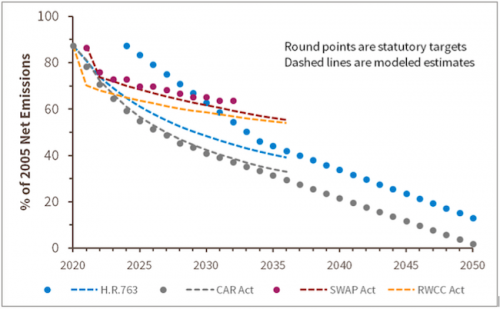How Do GHG Emissions Compare Under New Carbon Tax Bills?
 Just before the August recess, four new carbon tax bills were introduced, three in the House and one in the Senate. The Raise Wages, Cut Carbon (RWCC) Act (H.R.3966) is led by Illinois Democrat Dan Lipinski and cosponsored by Florida Republican Francis Rooney. The Stemming Warming and Augmenting Pay (SWAP) Act (H.R.4058) has the same two sponsors, but Rooney is the lead on that one. The Climate Action Rebate (CAR) Act is led by Jimmy Panetta in the House (H.R.4051) and by Chris Coons in the Senate (S.2284).
Just before the August recess, four new carbon tax bills were introduced, three in the House and one in the Senate. The Raise Wages, Cut Carbon (RWCC) Act (H.R.3966) is led by Illinois Democrat Dan Lipinski and cosponsored by Florida Republican Francis Rooney. The Stemming Warming and Augmenting Pay (SWAP) Act (H.R.4058) has the same two sponsors, but Rooney is the lead on that one. The Climate Action Rebate (CAR) Act is led by Jimmy Panetta in the House (H.R.4051) and by Chris Coons in the Senate (S.2284).
These bills differ in many respects, but for comparing how much they are expected to cut GHG emissions, the most important differences are in their starting carbon price and the annual rate of increase. For more information on each bill's specifics see the Carbon Pricing Bills in Congress resource page on Community, including a two-page PDF with more comparison tables and charts.
There is no single crystal ball that all economists agree on to make these predictions, but one of the more prominent ones is the Goulder-Hafstead (E3) model developed by Resources for the Future. When judging the effectiveness of a climate policy, it’s vital to make sure we’re comparing “apples to apples” by using the same model, and fortunately we already have E3 model results for the Energy Innovation Act (H.R.763) and all of the new bills.
The dashed lines in the chart show the E3 emissions forecasts for the first 15 years as a percent of 2005 net GHG emissions. Three of the four bills have required emissions targets, and those are shown as colored dots. Of these policies, the RWCC and SWAP Acts cut emissions quickly at the start, due to a high starting price, but then slow down due to the slower price increase. The Energy Innovation and CAR Acts, in contrast, start slower but become more effective after only three to four years. Over the 15-year modeling period, emission cuts compared to 2005 range from 45 percent for the SWAP Act to 67 percent for the CAR Act, with the Energy Innovation Act at 60 percent.
Rick Knight is Research Coordinator for Citizens' Climate Lobby.
Recent Posts
